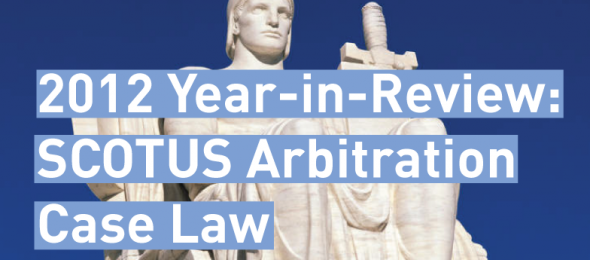During 2012, the U.S. Supreme Court decided several cases related to arbitration:
On January 10, 2012, the U.S. Supreme Court handed down CompuCredit Corporation v. Greenwood. The issue in CompuCredit was whether claims under the Credit Repair Organizations Act are subject to arbitration. The Court held that because the Credit Repair Organizations Act is silent on whether claims can proceed in an arbitrable forum, the Federal Arbitration Act requires the arbitration agreement to be enforced according to its terms.
On January 23, 2012, Petitioner Christopher Wanken filed a writ of certiorari (Docket No. 11-939) with the U.S. Supreme Court against Respondents Raymond James Financial Services, Inc. and its branch manager, John Dwight Wanken, seeking review of the Fifth Circuit decision on Wanken v. Wanken, No. 11-102219, 2011 U.S. App. LEXIS 20014 (5th Cir. Tex. Sept. 29, 2011). The petition was denied on April 13, 2012. Read more.
On February 21, 2012, the U.S. Supreme Court reversed and remanded orders of the Supreme Court of Appeals of West Virginia which held unenforceable all predispute arbitration agreements that apply to claims alleging personal injury or wrongful death against nursing homes. See Marmet Health Care Center, Inc., et al. v. Clayton Brown, et al., Case Nos. 11–391 and 11–394, 565 U. S. ____ (Feb. 21, 2012). Read more.
On November 9, 2012, the U.S. Supreme Court agreed to hearAmerican Express Co. v. Italian Colors Restaurant (Docket No. 12-133). The issue is whether the Federal Arbitration Act permits courts, invoking the “federal substantive law of arbitrability,” to invalidate arbitration agreements on the ground that they do not permit class arbitration of a federal-law claim. Read more.
On November 26, 2012, in Nitro-Lift Technologies, L.L.C. v. Eddie Lee Howard, et al, 568 U.S. ___ (Nov. 26, 2012), the U.S. Supreme Court vacated an Oklahoma Supreme Court decision because the decision ignored a basic tenet of the Federal Arbitration Act (“FAA”) and did not allow the arbitrator to rule on the validity of the contracts. Read more.
On December 7, 2012, the U.S. Supreme Court granted certiorari to Oxford Health Plans LLC v. Sutter (Docket No. 12-135). In the case below, Sutter v. Oxford Health Plans LLC, 675 F.3d 215 (3d Cir. N.J. 2012) the Third Circuit had held that that a party could not be compelled under the Federal Arbitration Act, to submit to class arbitration unless there was a contractual basis for concluding that the parties agreed to do so. Read more.
Stay tuned!













